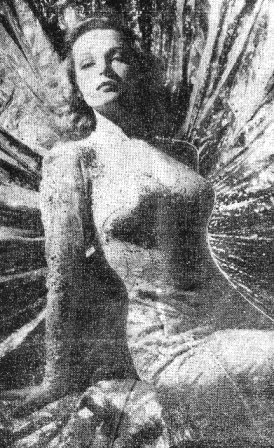
VOL. II NO. 35 REG NO. L5015 DELHI, THURSDAY MAY 11, 1944.
|
JAP POCKET AT INKANGAHTAWNG
P-40's, P-51's Hammer Defenses To Help Tank, Infantry Blow
MOGAUNG - Inkangahtawng one of the toughest stumbling blocks in the path of the Chinese-American advance towards Kamaing, was thoroughly reduced this week; and today Lt. Gen. Joseph W. Stilwell's forces were three miles past that landmark against severe enemy artillery and automatic weapon resistance.
Communiqu s made no effort to minimize the bitter, effective delaying action everywhere thrown up by the Japanese. But in spite of their stubbornness, Stilwell's forces pressed stoutly southward in an effort to burst through enemy defenses and strike a crippling blow against Kamaing.
Inkangahtawng is merely a name on the map; dignified not even by a single basha. But, in the area, the Japs concentrated to delay the Chinese battering their way southward west of the Mogaung River.
The assault upon the objective was delayed four days, due to dirty weather. For two weeks, Stilwell's drive had been stalled at Inkangahtawng. Finally, fighter-bombers of Brig. Gen. John Egan's Northern Assam Air Force found a hole in the overcast. In one hour, P-40 and P-51 pilots dumped 15 tons of bombs in an area 500 yards by 1,500 yards square, right on the nose. Deep-throated artillery belched destruction. This paved the way for scores of medium and light tanks to clank into action, and they were followed by infantry. The enemy concentration was shortly chewed up by this aggressive combined action.
ROAD BLOCK PLACED
As Chinese units moved into Inkangahtawng frontally, other forces swept in south of the area and clamped on a road block that hemmed in the Jap remnants in the stubborn defense sector.
The breakthrough did not mean, however, that there was to be clear sailing beyond Inkangahtawng. Some of the enemy pulled out to defensive positions farther south before the road block was established, and today they were pouring artillery and automatic weapon fir at the Chinese.
Some observers were of the opinion that the next heavy enemy defense position will be discovered at Pakhren Sakan, which is about six miles above Kamaing. Until that area is reached, there is level ground more or less suited to tank warfare. But at the moment the movement of tanks is restricted by rainfall and the fighting consists of frontline skirmishers.
Elsewhere, action continues in so many scattered localities that it is difficult to enumerate it all. Against Manpin and Paokum, most southerly advance of the Chinese eight and a half miles above Kamaing east of the Mogaung River, the enemy hurled several counter-attacks, which were repulsed. Along the trail winding southward through the mountains from Nphum toward Manpin. Chinese units are moving south of the captured villages of Kauri Warong and, between the tow, have taken the high position overlooking Auche. Below Nphum, a Jap pocket was aggressively liquidated.
In the valley, east of the Mogaung River, Chinese units are moving upon Wala and Hlagyi and, farther north, have driven to the north bank of the Tigrawn River and are pushing south past Ngagahtawng.
The Chinese who took Kauri and Warong and are hammering at Auche are moving toward the Manpin area over a labyrinth of trails, with the apparent object of consolidating with the spearhead force now within eight and a half miles of Kamaing.
Enemy resistance is now almost certain to stiffen, as their defensive front is constantly shortening and they are fighting on well-established interior lines. No evidence is yet reported of shortage of supplies. They have heavy artillery superiority and from concealed positions are pouring heavy salvoes night and day.
The fight is now developing into a desperate race to reach Kamaing before the breaking of the monsoon, because Kamaing is of immense strategic importance, a link of good supply roads leading to the vital Jap railroad centers of Mogaung and Myitkyina.
Little was heard of the action west of the Mogaung Valley in the Mansum area, except that an enemy party was caught in a concentration of mortar fire and seven were killed and that patrol action is continuing.
The Kachin Levies and Ghurkas along the Sumprabum-Myitkyina Road continued to harass the enemy repeatedly and around Tiangzup, still in Jap hands, threw almost daily confusion with ambushes and booby traps. Other actions took place at Warinkaung, the Mali River, Ritpong and Waxa.
|
NEW YORK - (ANS) - Paulette Goddard, in a press interview this week, described her CBI tour as a "tremendous emotional experience."
She said, "I want to go back again and again." She broke down when she spoke of the high morale of the troops and their gay spirit despite "frightening conditions." She declared, "They are wonderful, fine American guys."
She said, "I always tried to look my best. I wore shorts and a halter with lots of flowers in my hair or those bare midriff dresses with sequins that boys like. Even when it was cold I stripped out of my woolen undies and put on a bit of glamour for them."
She said she washed her face in left-over tea, creamed it with castor oil, scrubbed her teeth with grapefruit juice.
She said one boy asked if he could smell her hair. "He said I was the nicest thing he had smelled since he left home." She said that while American boys called her "Madame Cheesecake," British soldiers were more formal and called her "P.G.," while the Chinese called her "American Girl of Electric Form" and "Miss Precious Cargo."
She urged more "actresses in the flesh" for the CBI Theater. She said that Maj. Gen. Claire Chennault gave her flowers to wear in her hair.
She said Lt. Gen. Joseph W. Stilwell, "who has a twinkle," entertained her at tea. She said once she was only five miles from the Jap front but when she asked if she could go further Stilwell said, "Young lady, I think you've gone far enough."
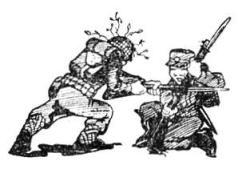
|
PAID - A DEBT OF HONOR TO CHINESE
Stilwell Confers Silver Stars Upon Heroes
|
Oh, East is East and West is West, and never the twain shall meet. 'Til all the lands stand presently at God's great judgment seat; But there is no east, there is no West, no border nor breed nor birth, When two brave men stand face to face - though they come from the ends of the earth. - Kipling |
MOGAUNG FRONT - It was, for the moment, quiet in the jungle. The crack of snipers' rifles and the deeper boom of heavier pieces were now stilled. The drone of the most lethal of all birds of prey was absent from the Burma sky, and the Japs, who once had marched proudly west as the advance guard of the Asiatic New Order, had retreated to the southeast, licking their wounds - except for those whose eyes stared sightlessly up at the burning, pre-monsoon.
And so it was time for a great and proud nation to pay a debt of honor - not to a vague and amorphous thing called China, but to seven slim, lemon-complexioned boys in mud-stained, jungle-torn uniforms, their shoe-button-bright eyes still slightly glazed by the fatigue of combat. For each had distinguished himself against a ruthless enemy of all freedom-loving peoples - each had recklessly risked his own life for the sake of his comrades and his comrades' cause, over and above the ordinary call of duty.
A sharp command rang through the jungle glade, and seven tired bodies snapped to attention. Into the clearing strode with brisk, jerky steps, a wiry, dynamic man in the battle-worn field uniform of a lieutenant general in the United States Army. A few crisp words in high-pitched Chinese. Then, representing the President of the United States in the second ceremony of this kind since the Hukawng-Mogaung fighting began, Lt. Gen. Joseph W. Stilwell pinned on the breast of the seven soldiers of China the ribbon of the American Silver Star.
Here is the Roll of Honor:
SGT WANG CHENG-CHI - For "able leadership and gallantry" during the battle of Patzi Hka, Jan. 24. Platoon Leader Wang led his unit in the capture of an enemy post held by an overwhelmingly superior enemy force, destroying two mortars, four heavy and two light machines guns and one 75 mm cannon. During the action, Wang, after killing a Japanese field officer, single-handedly grappled with two Japanese who were in the act of throwing hand grenades which would have inflicted heavy casualties on his unit, desperately risking his life to disarm them and take them both prisoners.
PVT. CHANG YU-CHUAN - For attacking a Japanese flank guard alone and fighting it out single-handed with five Japs. When attacked by the Japs, instead of retreating to join his main force, which would have endangered
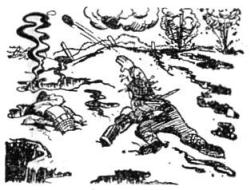
|
PVT. YANG YUN-LIN - For killing five Japs single-handed out of a patrol of 50 or 60, and obtaining valuable information which led to the capture of a vital heavy machine gun post.
PVT. TENG YUAN-PANG - For crawling alone up to an enemy machine gun post which was holding up the progress of an entire Chinese column in the Shingbyan fighting. Edging his way to within grenade range, Teng threw his missile with such deadly effect that the enemy post was obliterated, opening up the advance for his unit at a crucial stage of the fighting.
CPL. CHAN TAI-SHAN and PFC. YANG LIN-YU - Who, on patrol duty together, saved a disabled tank from being captured by effectively holding off a superior party of the enemy, after which they brought back valuable information which affected the future course of the fighting.
CPL. HSIEH CHAO - Who, "disregarding intense enemy fire," led a charge on an enemy position at Maingkwan, capturing a Jap machine gun nest and himself killing several Japs.
Five other Chinese soldiers were commended for gallantry.
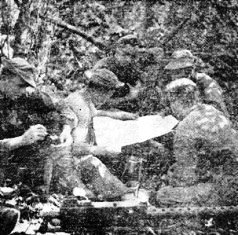 A group of Burma Raiders inspects a map of the strange new territory in which they are fighting the Japs.
A group of Burma Raiders inspects a map of the strange new territory in which they are fighting the Japs.
|
 It's breakfast time in the jungle for this group of Infantrymen, cooking a steak given them by Kachin tribesmen.
It's breakfast time in the jungle for this group of Infantrymen, cooking a steak given them by Kachin tribesmen.
|
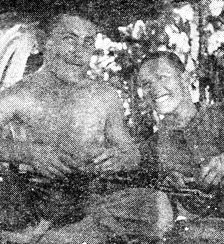 Gun cleaning occupies the attention of Sgt. Seabrook Bowen, left, and Pfc. Tom Dubois.
Gun cleaning occupies the attention of Sgt. Seabrook Bowen, left, and Pfc. Tom Dubois.
|
By now, if he hadn't previously, the Jap has learned to fear Brig. Gen. Frank Merrill's Burma Raiders, first Yank infantrymen during this war to go into combat on the Asiatic Continent. At Walawbum and other obscure pin-points on the map of Northern Burma, the Raiders have moved with speed, daring and imagination. Their engagements have ranged from pitched battles as at Walawbum to hit-and-run raids such as at Inkangahtawng several weeks ago. The Yanks have whittled Jap strength and have added weight to the steady advance of the Chinese 22nd and 38th Divisions bulling their way frontally down the main road towards Kamaing, Mogaung and Myitkyina. Communiqu s have not mentioned the Raiders recently, but this must be cold comfort to the enemy. When and where the Yanks will next hit is a problem that must have the Japs gnashing their buck teeth down to the gums.
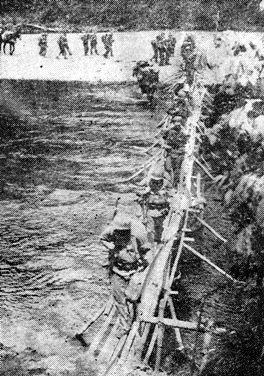 A column of men and animals cross a bridge on their way toward the front.
A column of men and animals cross a bridge on their way toward the front.
|
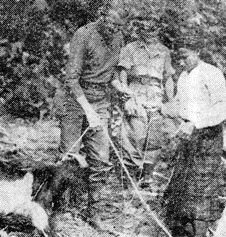 Kachins present a goat to Brig. Gen. Frank Merrill, commanding the Raiders.
Kachins present a goat to Brig. Gen. Frank Merrill, commanding the Raiders.
|
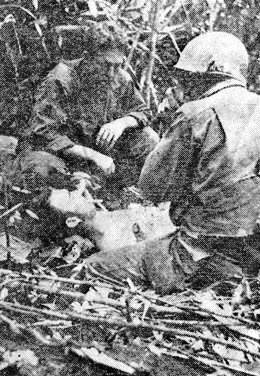 Medical aid men dress the chest wound of Sgt. Paul Tibbs in the combat sector.
Medical aid men dress the chest wound of Sgt. Paul Tibbs in the combat sector.
|
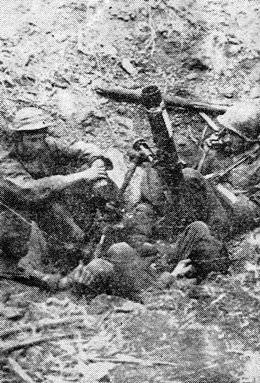 Crew of an 81mm mortar awaits fire orders, burrowed into a hole made by a 500-pound bomb.
Crew of an 81mm mortar awaits fire orders, burrowed into a hole made by a 500-pound bomb.
|
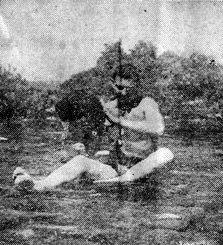 Laundry and bathing are done simultaneously by T/5 Ed Jacoboski in a jungle stream.
Laundry and bathing are done simultaneously by T/5 Ed Jacoboski in a jungle stream.
|
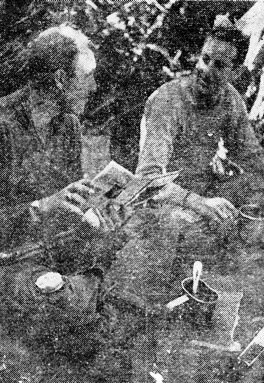 Two officers - Lts. Paul Bergman, left, and Alvin Effron - discuss news in air-dropped magazine.
Two officers - Lts. Paul Bergman, left, and Alvin Effron - discuss news in air-dropped magazine.
|
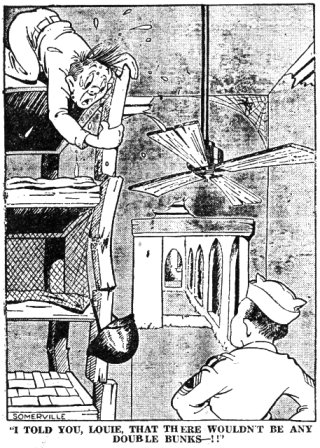
|
G.I. - OPERATED FERRY
STRICTLY TEEKAH
APO 492 (Bombay) - A group of G.I.'s are operating what is believed to be the only Army ferry in Asia here, according to the Tiger Rag, base fishwrapper.
The ferry service is under the command of Lt. Gabig, whose navigation saves a land detour that would ordinarily take and hour more than the time by ferry.
His crew are the self-styled River Rats, composed of five enlisted men.
The River Rats are made up of Sgt. Tony Yulieano, Pfcs. Albert J. Cotugno and Harold W. Smith and Pvts. Albert Zocour and John C. Conternon.
The ferry has two Chris-Craft teamed with four utility boats. Crewman Cotugno is saving all the pictures he can find of brawny lifeguards lolling around pools with luscious bathing beauties, since he believes he can qualify as a seaside guardian after the war. To date he is credited with saving three fellow G.I.'s from a watery grave by use of the swamp glider.
(Ed. note-Don't ask us what a swamp glider is. We don't know either.)
Yulieano is chief mechanic of the ferry service. he is one of those responsible for the yarn that an Indian boat propelled by a porpoise was seen by the G.I. ferrymen on one of their trips.
The Army ought to know better than to make sailors out of soldiers anyway.
Miracle C-47 SURVIVES ATTACK BY ZEROS
EAC HQ. - A bullet-riddled C-47 of Brig. Gen. William D. Old's Troop Carrier Command recently landed at an emergency field at a forward airstrip, with over 100 bullet holes in the after part of its fuselage and petrol tanks.
Fifteen of its Indian and Ghurka passengers showed the effects of a hasty first aid, which, according to the medical officer, saved many of their lives.
The first aid had been administered by Lt. Cecil B. Brantley, who, while the plane was being attacked by three Zeros, had gone about the job of helping the wounded, while Jap bullets tore through the fuselage.
Sgt. Walter Muellerschoen, radio operator, was one of those treated by Brantley, but he stuck to his set and wired the airstrip for medical aid to help the wounded. After the plane had landed, S/Sgt. John S. Crowe, crew chief, turned to Lt. Brandt, the pilot, and said, "Kind of a rough day."
 COWBOY SPINS, G.I. CHORUS DANCES
COWBOY SPINS, G.I. CHORUS DANCES
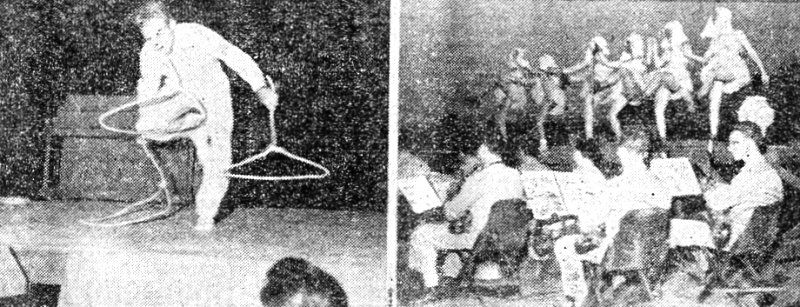 Action-studded Hey, Rookie is now touring India. It is an all-G.I. show, made up of former professionals.
Above left, Sgt. Jack Rinehart, former rodeo star, spins three lariats simultaneously, jumping in and out of one
at the same time.
Action-studded Hey, Rookie is now touring India. It is an all-G.I. show, made up of former professionals.
Above left, Sgt. Jack Rinehart, former rodeo star, spins three lariats simultaneously, jumping in and out of one
at the same time.
NEW DELHI - Hey, Rookie, a G.I. show of, by and for G.I.'s is now touring the India sector of the CBI Theater and for the next three months this group of former professionals will entertain American troops here.
It is the first Special Service unit to come into the Theater from the outside world. In this case, it came directly from the Fifth Army front in Italy.
The show gave its first regularly scheduled performance this week in Little Washington to patients from the Station Hospital. Working from the portable stage they carry with them, the singers, dancers and monologists soon had staid Queensway lined with an international audience that included G.I.'s, WACS, British and Indian troops, civilians and a line of awed Tonga-wallahs, whose horses threatened to stampede when the hill-billy band burst forth into Pistol Packin' Mama.
The show should be a cool breeze in the monotonous heat of the Indian summer for the entertainment-starved G.I.'s over here. It's a high class variety bill that breathes a bit of America into every act, from the impersonation of FDR by Bryce Santry, to the hilarious double-talk routine of veteran vaudevillian Chick Dent.
There's a cast of 45, including an orchestra of 17 under the direction of T/Sgt. Paul Tompkins, who learned his obligattos in Hollywood. The show features a lively ditty, A Helluva, Swelluva, Helluva Life In The Army, written by T/Sgt. J. C. Lewis. This piece was voted the best marching song of the war by Life and Time magazines, according to T/4 Max Fetty, who acts as ballyhoo man.
Mousy Garner, one of Ted Healy's original Three Stooges, puts on one of the familiar stooges slapping acts, with the hitting assistance of violinist Cy Silberg and Sol Adelstein. If they aren't all suffering from facial prickly heat after a week of that routine here in India it will be a miracle.
Erwin Grandy, selected by Tommy Dorsey as his pick for "Star in Uniform," sings; Buddy Lewis impersonates Jolson, Winchell, Cagney and Durante among others; Jack Rinehart almost makes his lasso live, and for a few moments, we thought we were finally going to see the Indian rope trick; Earl Paul knows how to use his banjo; Glenn Turnbull shows how he use to tap in "Meet The People"; Larry car brought many a romantic glint to a G.I. eye with his Begin the Beguine."
The show ran into brass hat trouble and had to lift a number when some of the boys came on the stage in their undies in the States; had to move their portable stage at Cassino when the Nazis decided to give them an artillery greeting, and played to the most cosmopolitan audience of their career here in Little Washington. The boys think they have seen about everything. Wait 'til they hit Assam.
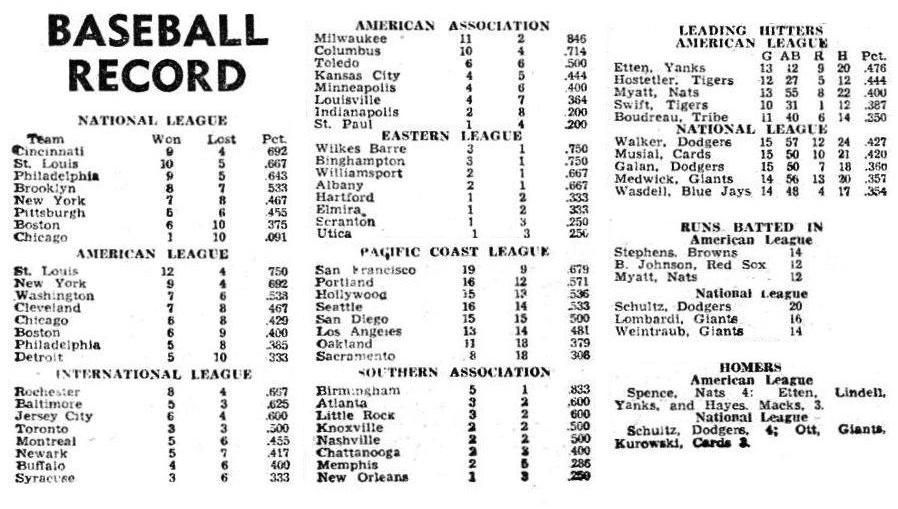
JAP SUPPLY PROBLEM WORSENS IN MANIPUR
NEW DELHI - The Jap was still on the move in the Manipur area this week, but he was mostly going backwards.
His legs were growing weak and his stomach was shrinking. The invasion of India that started off so well early in March had seemingly broken its force against the British land forces and Allied air power.
The British were on the offensive all over eastern India. They announced reoccupation of the Naga village of Kohima, clearing of a road block on the Silchar-Bishenpur Road and lessening of Nip pressure around isolated Imphal.
The Japs counter-attacked in all sectors, but it was announced they were repulsed with heavy losses.
There is still plenty of hard fighting ahead before the Jap threat to Allied Burma communications can be considered spent. The British must clear numerous road blocks between Dimapur and Imphal, after they have cleared the Japs from the Kohima area.
Indications this week pointed to increasing supply difficulties for the invaders. All areas surrounding Kohima have been cleared of food. Jap foraging parties were returning empty-handed.
The British dryly announced that even the village dogs had been cleared out. They also expressed hope that the Japs were enjoying the rice they had captured in Kohima village. The British had thoughtfully soaked it in kerosene before leaving it behind.
British scouting parties reported that it has been found that the Japs are now rationing ammunition. It was estimated that they are allowing only three shells per gun daily. Some scouts reported the Nips were refilling old shell cases at jungle ordnance plants.
NIP STRENGTH WEAKENING
news from the Chindits said they had accounted for at least 3,000 enemy dead in beating off attacks on their block on Nip communication lines around Indaw-Myitkyina Road.
The situation in the Arakan did not look as good. The British announced abandonment of the village of Buthidaung since it has no strategic and is vulnerable to shell fire. A SEAC communiqu emphasized that this abandonment does not mean that Allied control of the vital road through the Mayu range will be affected.
The British have also announced loss of the village of Paletwa on the Kaladin River, 100 miles north of Jap-held Akyab in west Burma.
The Admiralty stated that British submarines are mustering in Far Eastern waters for a smashing blow at Jap sea communications. Subs from the Mediterranean are being refitted to join the British Fleet in the Indian Ocean.
In Washington, American military observers said Lord Louis Mountbatten will hurl greatly increased sea and air blows against the Japs in the Indian Ocean with the coming of the monsoon season, when land activity will be hamstrung by the weather.
The United Press said that Japan is relying mostly on sea-borne traffic to supply her Burma forces and quoted military observers in the U.S. as speculating that recapture of the Andaman Islands may be attempted.
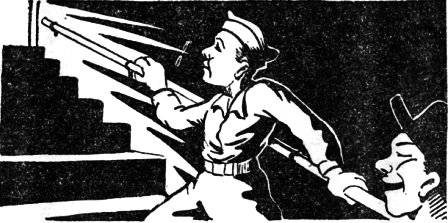
|
BLACK MARKET DEAL
WITH FU MANCHU THRILLS
By WALTER G. RUNDLE United Press Correspondent
KUNMING - You're a G.I. fresh "over the hump" and taking your first flier at buying yourself a wad of C.N. (Chinese National currency) in the black market. You ask the guy in the bunk beneath you in the hostel where you're quartered how to go about it. His instructions are simple:
"Snag a ride on any jeep headin' for town," he says. "Drop off at the second traffic station, turn right up the street about two blocks and then into sort of an alley anglin' off left. Just amble along and keep your ears open. Ya can't miss."
So you button your dough in your shirt pocket, jam your flashlight into a rear pocket and an hour later you're elbowing your way through a narrow, dimly-lighted, humanity-filled street. From the windows of the shops eerie shafts of light slant through the gloom, illuminating briefly a few of the seemingly endless stream of faces flowing by. You try to spot your man - a black market operator - by some sinister look, some furtive manner. But it's no soap.
You're just beginning to wonder if you look suspicious when you become conscious of a slight plucking at your sleeve and of a man in a long, dark Chinese coat and felt hat walking beside you. He doesn't look at you. But from the corner of his mouth he says:
"Change money?"
You try to act disinterested, and with just one sidelong glance inquire:
"How much C.N. for gold?"
"Gold," in black market parlance, is the good old American dollar.
"Hundred ninety," your man says, again out of the corner of his mouth.
"Boo how. No good," you reply, using 50 percent of the Chinese vocabulary you've acquired to date. Whatinell does this guy think you are? A sucker? The fellows at the mess said "the rate" was between 200 and 210. You lengthen your stride to emphasize that you can't be had that easily.
Your new acquaintance moves alongside once more.
"Hundred ninety-five," he says.
"Two hundred ten," you say firmly, to let him know you know what the score is.
"Hundred ninety-seven. Vely good."
You've got him coming your way now, so you follow him as he beckons you into a darkened doorway.
Five minutes of haggling in pidgin English gets the rate up to 200 CN and establishes that you have one hundred bucks you want changed.
Your man indicates you're to follow him, and without once looking back, plunges into the stream of traffic. He turns off the main drag and you find yourself groping your way along a lightless, cobbled street past mysterious, shuttered houses through whose weather-beaten wall occasional fingers of dirty yellow light reach out into the velvety black.
You stop in the pitch-black doorway of one such building and your man knocks softly. The street is so deserted, so still, you instinctively look over your shoulder to see if you're being followed; if anyone has heard.
There's a hushed exchange of conversation in Chinese and the door is unbolted, and opened a crack. In the light of a flickering candle you can see the wrinkled, toothless face of a woman. Your guide beckons you inside and up a flight of rickety, unlighted stairs. You can hear the muffled sound of several male voices from above and you wonder briefly if maybe you're being a chump. But it's too late to turn back now.
At the head of the stairway, a soiled curtain is pulled aside and you're ushered into the presence of four men in a dimly-lighted room. You stop, just inside the doorway - best strategic position in case of trouble. The setup reminds you of the settings for the old Fu Manchu movie thrillers. And every one of the rag-tag characters in the room reminds you of Wallace Beery in his tougher roles. They grin broadly and beckon you to a chair at a table at the very back of the room. You hesitate, but what-the-hell. You're in it now, so you may as well go through with it.
You take the seat offered, unbutton your shirt pocket and display the evidence of your sincerity - five crisp sawbucks and a wad of fins. Clutching them firmly in one hand, you multiply 200 by 100 on a scrap of paper. The circle of faces around you look at the figures, nod in agreement and, from inside their loose robes, begin disgorging the bundles of bills which seemingly line them. Folded packs of 50 and 100 dollar notes. You count a couple. They're standing around you in a tight circle, eyeing you closely. "Simple matter" you tell yourself, "to tap a guy on the head and take his hundred gold. Chances are no one ever would know what happened."
You decide to take their word for the count, surrender your dough and wait nervously while they check it.
Then you make for the door. You tell yourself you're not really scared. Just want to get out of the place. The stairs seem longer and darker than you remembered them.
Finally you reach the street. There's a friendly, lighted window a block ahead. You breathe more easily, but you walk briskly, conscious of your bulging pockets. You pat them appraisingly.
"Jees, think of it. Twenty thousand smackers: Twenty G's; You're rich."
You're daydreaming about what you could do with that kind of dough back in the Stateside league when you reach that lighted window.
One item catches your eye: An alarm clock and a price tag - $2,000.
Just an ordinary, lousy dollar ninety-eight alarm clock back home. TWO THOUSAND BUCKS!
"Buddy," you tell yourself, "You gotta get used to a new set of values."
MARE TEMPTS MULES IN ASSAM FLIRTATION
By Sgt. SMITH DAWLESS
ALONG THE LEDO ROAD - Oh, Missouri! In the jungle corral, the herd of mules stamped and champed. Restless they were with Spring making its two-day visit to Assam.
A Chinese major passed along the Ledo Road. An unimportant event, except that he rode a light-stepping sorrel mare. The mare, a typical feminine teaser, rolled a coy eye mule-ward, flicked her tail coquettishly. It was the flick that did the trick. The Primitive Male, which the unfortunate mule seldom gets a chance to express, asserted itself. Down went the bamboo barrier, out poured the avid-eyed mules, off dashed the malicious little mare.
In no time at all, traffic jammed. Trucks bellowed, jeeps peeped, anxious G.I.'s swarmed into the confusion attempting to stuff mule-heads into burlap bags. Officers, bearing Tommyguns and a dim hope of quelling the thundering herd, followed. The major and the mare had vanished.
Being seasoned Army veterans, the mules deployed. Into camps, across rivers, through villages. AWOL they were, and determined to make the most of it. Three days later, one of the critters stumbled into the local bazaar which nowadays presents all the aspects of a Utah ghost-town. "Hi-ho, Silver!" yelped an M.P. (Mule Procurer) as he made the last roundup.
The vagrants face a possible court-martial and a sentence not to exceed six weeks. And all mares have been warned to tend to their gaits when passing Little Missouri.
G.I.'S ON TOP OF INDIA PORT DOCK CRISIS
G.I. office workers at an Indian Ocean port threw aside their pencils, abandoned their chairs and scrapped the Army's traditional "don't volunteer for anything" slogan recently when coolies working on the docks went on strike.
Forty members of the chairborne infantry volunteered to help out on the docks until the labor trouble was cleared up.
The entire Adjutant's office threw aside its rubber stamps and lifted boxes, pushed carts and heaved crates. The entire Signal Section stopped counting radios and started unloading ships.
The crisis had been met.
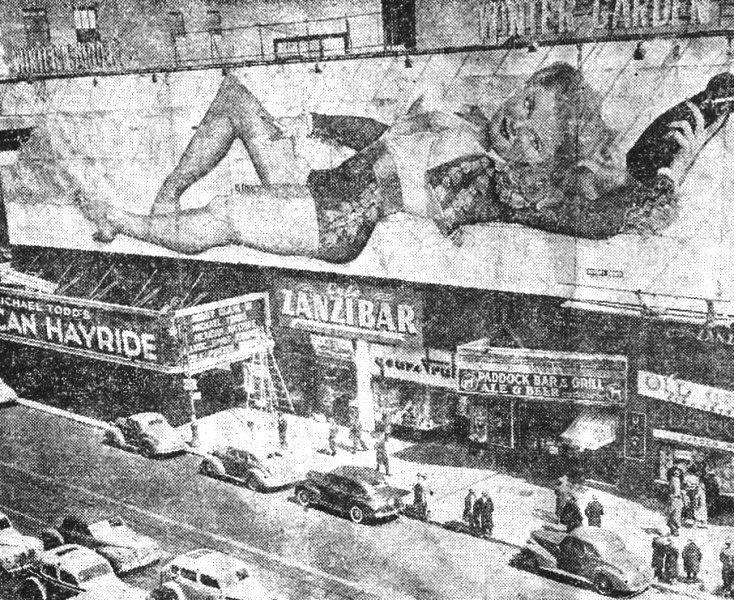
NEWS 'SCOOP' DEBUNKED
JUNGLE CRITTER BAGGED BY OTHERS
Unlucky Roundup! Every time we think we have a hot news scoop, we are likely to discover either that the story is as old as the hills to certain members of our far-flung reading public, or else that we have foully, although unwillingly, maligned certain sectors of the electorate.
Not long ago we published a picture forwarded to us in all good faith by Cpl. Robert A. Aylward,
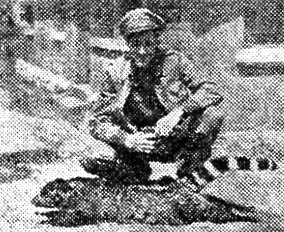
|
"Rare, hell," was the immediate response the Roundup received from readers, a number of whom wrote in to say that the animal, which looks like a combination raccoon, badger and alley cat, is about as rare as monsoon mud in their neck of the woods.
Particularly irate was Sgt. N. H. Nicholson, of a P-38 fighter squadron. "It is not our desire to detract any glory (from the major) that might be attached to the bagging of such an unusual animal," Nicholson wrote, "but we do question the activities of the Calcutta Zoological Society for the past 50 years." Nicholson and his buddies, it appears, have trapped a number of the critters near his camp, a fact attested to by Lt. Ben Beach, Jr., of Nicholson's outfit.
S/Sgt. Grover M. Miller, Cpls. Albert C. Swanson and Richard H. Bevier, and T/5 Maurice E. Young, all of a QM truck company, wrote for more humanitarian reasons - namely, to warn the good major that no matter what he and the Calcutta Zoological Society may think from examining the dead body of a "whatizzitt" it is an animal to be treated with utmost respect when encountered alive.
Seems a number have been observed in the QM truck company vicinity, and the boys have learned that anyone becoming intimate with the species "should be warned that its habits are much the same as a good old American wood pussy and it should accordingly be approached from the front only."
Still a third communicant was S/Sgt. Richard Dixon, writing from "Somewhere in India," who also bagged an elusive "whatizzitt" during a hunting expedition. Not realizing that fame was knocking at his door, Dixon merely buried the animal, possibly for the reasons cited in the paragraph above. Later, he put his faith in an American dictionary instead of the Calcutta Zoological Society. In the dictionary he found a picture of the beastie, defined as an animal similar to the American civet cat and a member of the mongoose family.
2nd Carrier Squadron Honored
TROOP CARRIER COMMAND BASE - Ever since March 2, 1944, the proudest squadron in the British-American Troop Carrier Command has been the 2nd Troop Carrier Squadron (USAAF).
The reason? Just look at the manly bosom of any of the squadron's members and you'll see there the gleaming ribbon of a War Department unit citation, awarded in recognition of "outstanding performance of duty in action from Jan. 26 to Dec. 31, 1943."
This embraces a period of intense activity in which the squadron doubled in brass. During the first half of 1943, the squadron's mission in life was that of flying equipment and supplies across the perilous Hump to Maj. Gen. Claire Chennault's 14th Air Force and to our Chinese allies. So vigorously did the squadron pursue its duties that during the three months of April. May and June, 1943, it transported over 60 percent of all tonnage that crossed the Hump, in spite of the fact that it had only 10 percent of all planes flying the route.
Then, in July 1943, the outfit turned to the job of air-dropping supplies to Lt. Gen. Joseph W. Stilwell's Chinese-American Hukawng Valley forces, while still continuing to fly into China all the supplies required by the Chinese "Y" forces.
In both types of work, the record of the 2ndSquadron has been outstanding. Marks have been set in sortie and tonnage records, vast amounts of food and supplies have been dropped on pin-point targets deep in the jungle, the threat of Jap interception has been disregarded in spite of casualties, and ground crews and air crews have worked together with unfailing teamwork. Brig. Gen. William D. Old, Air Commander of all British and American Troop Carrier Squadrons in this Theater, said of them recently: "Those boys don't give records a chance. They just keep breaking them."
That, evidently, is what the War Department thought, too, of the members of Maj. Frank E. Sears' squadron. Hence the citation.
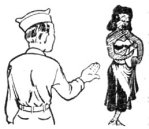
|
By LT. FRANK S. DEMPSEY
ATC BASE, INDIA - After many a dry run, the men of the ATC unit here were told that tomorrow would be the day when they could fire their weapons on the range, thus, among other things, denying the infantry canard, that, "give an airman a rifle and he'll try to shoot out of the stock."
Lt. Murray Gendell, well aware of the fact that his prides and joys were far from Daniel Boone's, decided it was only fair to warn the public that firing was going on. So he carefully placed two red flags on either side of the firing pits.
Came firing day and everything went off according to schedule. But when the second day dawned, Gendell discovered that one of his flags had vanished.
The lieutenant, knowing well the strange ways of the American soldier, wondered if any of the G.I.'s had taken up bull fighting. But a careful survey of the numerous cows and bulls that daily over-run the field failed to disclose any with banderillos hanging from their cow-like necks. Nor were there any irate cow owners around threatening to sue Uncle Sam.
But the lieutenant, gazing at the women workers in an adjoining field, in the best tradition of an officer and a gentleman, saw some flashes of red amongst them. A survey revealed that no less than 10 of the damsels were attired in bright red skirts, and little else.
The lieutenant went back to his quarters and found a private who could speak Hindustani. He got this G.I. genius to question the "women in red," but the guy was far from a J. Edgar Hoover. He got:
Three sets of giggles. Four looks of bewildered ignorance. There "Nay malum, sahib."
The lieutenant couldn't bust the private to a civilian, so he just turned in a report - "One red flag missing."
JAP TROOPS, TRUCKS HIT BY 14TH A.F.
14TH AIR FORCE HQ. - Hard-hitting pilots of the 14th Air Force this week administered a severe lashing to Japanese troops and Tojo's motor transportation.
One of the 14th's major days came at week's end, May 6, when the Chinese-American Composite Wing roared vengefully along the Hsiangcheng-Daih Linju Road in the Yellow River area in support of Chinese ground operations and knocked out from between 20 and 30 vehicles and killed an estimated 250 enemy soldiers.
Over the target, the Allied-manned aircraft encountered two Jap fighters, one of which they shot down.
FIVE TANKS STRAFED
Shortly after, Composite Wing fighter-bombers strafed troops and vehicles in the same area and scrambled 100 vehicles, including five tanks, all of which are believed destroyed.
Meanwhile, in French Indo-China, fighter-bombers of the 14th sank a 75-foot barge at Khampha Port and created havoc among a concentration of sampans near Cat Ba Island. At least 15 sampans were destroyed, another 25 damaged, while approximately 15 boats, measuring from 50 to 75 feet long, were destroyed.
Other fighter-bombers attacked Japanese installations along a railroad between Phu Lang Thuong and Langson, destroying two locomotives and damaging or destroying 93 railroad cars.
Earlier in the week, the Composite Wing had killed 300 to 400 Jap soldiers and destroyed 15 motor trucks on the road from Layang to Luchou in the Yellow River area.
SEA ATTACKS MADE
At the same time, Chinese-American Mitchells strafed and damaged 14 trucks on the road northeast of Nihsie. On the road between Hauchang and Yuchou, they strafed and damaged approximately 110 trucks moving toward Yuchou. The motor pool just southeast of Chihsien, in which from 200 to 300 trucks were concentrated, was then bombed. Later, another 100 trucks along a road north of Yenling received the same treatment.
As this mission was being carried out, Liberators, on a sea sweep of the South China Sea, attacked a six-ship convoy, sinking one 4,000-ton freighter. Another 900-ton freighter was later attacked and sunk.
Two days later, Liberators hit French Indo-China. On a sea sweep off the Southeast China coast, B-24's attacked one 800-tron and one 500-ton vessel, both of which were damaged.
At the beginning of the week, Mitchells flew over Amoy Harbor, on the East China coast, sinking a 1,000-ton freighter with direct hits by cannon shell and two bombs. Other Mitchells, with fighter escort, bombed the airdrome at Tongyand, northeast of Ichang in the Yangtze River area.
 KIPLING UP-TO-DATE When the dawn comes up like blunder Out of China 'cross the" Hump." And I sit here thinkin', shrinkin', In this blinkin', dinkin' dump. Oh, I'd give a million dollars Just to get a drink of "pop" or to talk for just five minutes With an old-time city cop Oh, I wish that I were home again In any old cafe. And I'd take the dingiest barmaid To the fairest here today; For her skirt may've once been yellow And her cap, it might be green But they surely are the dirtiest, That I have ever seen. Oh. Kipling may have kissed her In the cow dung where she stood. And it might be that he liked it, But I don't see how he could. Yes, the temple bells are callin', But it's not here that I would be; It's the rumbling of the subway At Times Square that's callin' me. On the road to far Cathay. Where the flying' beasties play. And they sting you and they wing you From Chungking to Mandalay. - By Cpl. JOHN D. MURRAY |
EAC Aircraft In Busy Week Against Jap
U.S. and RAF heavy and medium bombers of the Strategic Air Force, Eastern Air Command, during the week ended May 7 concentrated their efforts mainly against communications and Japanese dump and supply targets in the northern part of Burma.
A major operation was that of May 1 when U.S. B-25's, in strength, attacked Kalemyo, causing many fires and explosions. The same day RAF mediums bombed the dump area at Kalewa and reported a big red fire in the center of the target.
On the night of May 4-5 RAF heavies effectively bombed the Maymyo barrack area, following a day in which U.S. heavies and mediums and RAF mediums had covered targets ranging from Mandalay rail objectives to lines of communication in North Burma.
VITAL COMMUNICATIONS
These lines of communication, vital to the Japanese, both for pushing of supplies for their battalions in the Imphal area and for the enemy forces ranged against Lt. Gen. Joseph W. Stilwell's troops and the Chindits in North Burma were attacked steadily during the week. U.S. B-25's kept hammering at bridges and, with RAF mediums, were out in daylight over the Imphal-Tiddim Road and stores dumps adjoining it.
RAF mediums were operating several nights in moonlight against Japanese road convoys which found it too risky moving by day.
In Manipur, with our troops going over to the offensive, RAF and IAF fighters, fighter-bombers and dive-bombers, kept up ground support attacks against enemy troops, positions, gun sites, camps, communications and other targets of opportunity. They rarely missed a chance to open up with their cannon and machine guns on tanks, armored vehicles or other motor transport, though the weather made their work especially difficult on a number of days. Dive-bombers were effective against pin-pointed targets in the Kohima area and RAF fighters cooperated with them in the softening-up process before our ground troops attacked.
SIXTH BUSIEST DAY
farther south, in the Arakan, Mayu and Kaladan areas, the main objectives were again communications, particularly rivercraft, a considerable number of which were destroyed or damaged.
Busiest day for U.S. fighters, fighter-bombers and dive-bombers in North Burma was the 6th. Typical was one attack by P-51's in which a warehouse and locomotive shelters south of Namtu were bombed. Smoke rose to 2,500 feet. There were six direct hits on railroad trains. In other operation that day, P-51's and A-36's concentrated on petrol dumps south of Myitkyina. There were violent explosions.
RAF long-range fighters took advantage of the moonlight to supplement their daylight strafing of communications and special targets in Central and South Burma.
Enemy activity was less than the week before, but U.S. and RAF fighters destroyed seven enemy aircraft, five over or on their bases in Burma.
APO 627 Sees All-G.I. Show
APO 627 (China) - Under the direction of Lt. Robert M. Smith, a 20-act, all-G.I. variety show was presented at this station last week by the enlisted personnel of the AACS Detachment.
With Allen W. Callahan as emcee, Lt. bailey and his band playing popular numbers and Pfc. Harold K. Potters doing a strip-tease, the show was well received and was a great morale booster.
Hellzapopping, with a larger cast, will be presented by the AACS boys on June 5.
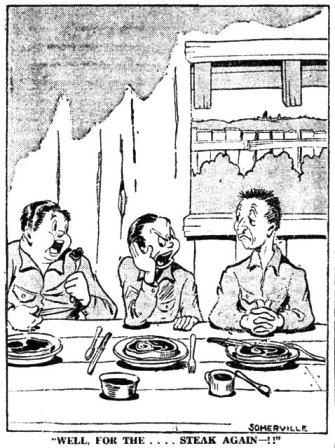
|
‘BITCHING’ FINE G.I. ART
Yankee Doodler Gives Pointers
(The following article was originally published in the Yankee Doodler-The Editor.)
By M/Sgt. ARTHUR E. SMIT
ASC CENTER, INDIA - After an exhaustive search through all available military publications, our research department fails to find any comprehensive guide by which the uninitiated may compete more favorably with the more illustrious and chronic grouch in the ancient science of "bitching."
It is believed that careful study and strict application of the principles outlined in the following basic situations will assure the most genteel introvert a nod of approval from his more dyspeptic brother.
The mess hall is an excellent and fertile field for the application of "bitching." To assure the proper frame of mind upon entering the mess hall, every effort should be made to remove from one's appearance any semblance of cheerfulness. A smile is inconsistent with the best form of griping and indicates lack of sincerity. People may even like you, if you smile.
Convince yourself that you cannot, under any circumstances, enjoy the food served. When you come down the chow line to the American corn or peas, let out a few select cuss words with an appropriate bellow of disapproval. Be sure the mess sergeant and cooks hear you - it definitely increases their incentive to do better.
At the mess table, join in whatever conversation is going on and steer it skillfully into the subject of your pet peeves of the day. make it plenty loud, as this will cause widespread indigestion to those within hearing distance (Oh, Happy Day.)
Advantage should be taken of every circumstance. At noontime, wait until your buddies have dropped off into a drowsy siesta. (This is a real opportunity.) Start your "bitching" with a bang. Wake them all up with a jolt. (Frayed nerves are lots of fun.) Immediately you will become the center of attention. Whatever you do, don't allow them to fall back to sleep. Several days of this will decrease your popularity immensely - but what the hell, you'll have more to bitch about.
A the theater you have an audience made to order. This choice situation calls for plenty of lung work. Be sure your moronic remarks can be clearly heard above the noise of the loudspeaker. Of you've seen the picture before, let everybody know it.
Let them in on the climax. It always adds to the enjoyment of a picture to know how it's going to end. If there are ladies present, go through your repertoire of insolent and profane language. This is so embarrassing to them and you may even get a laugh from an imbecile friend. Don't let a good picture break down your resistance - whatever it is - it's stinkeroo.
After you have thoroughly mastered any type of situation that might arise - and you find, as you eventually will, that you can't stand being around yourself - you may relax in the satisfying and refreshing thought of how much those at home, after the war is over, will wish you were "to hell back in India."
The C.B.I. Roundup is a weekly newspaper of the United States Army Forces published by and for the men in China, Burma, and India, from news and pictures supplied by staff members, soldier correspondents, the United Press, OWI and Army News Service. The Roundup is published Thursday of each week and is printed by The Statesman in New Delhi, India. Editorial matter should be sent directly to Capt. Floyd Walter, Headquarters, U.S.A.F., C.B.I., New Delhi, and should arrive not later than Sunday in order to make that week's issue. Pictures must arrive by Saturday and must be negatives or enlargements. Stories should contain full name and organization of sender.

MAY 11, 1944
Original issue of C.B.I. Roundup shared by Ruth Canney, widow of CBI veteran John Canney.
Copyright © 2007 Carl Warren Weidenburner
TOP OF PAGE PRINT THIS PAGE ABOUT THIS PAGE SEND COMMENTS
PREVIOUS ISSUE CLOSE THIS WINDOW NEXT ISSUE
